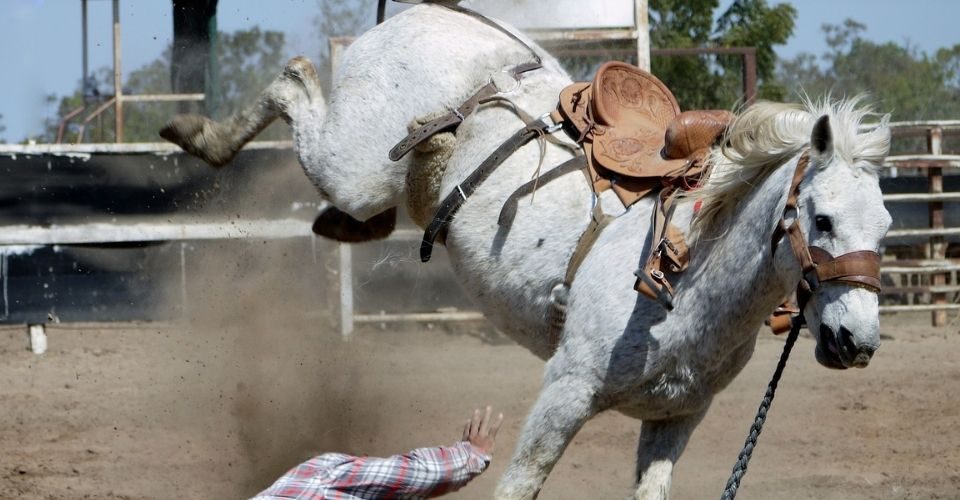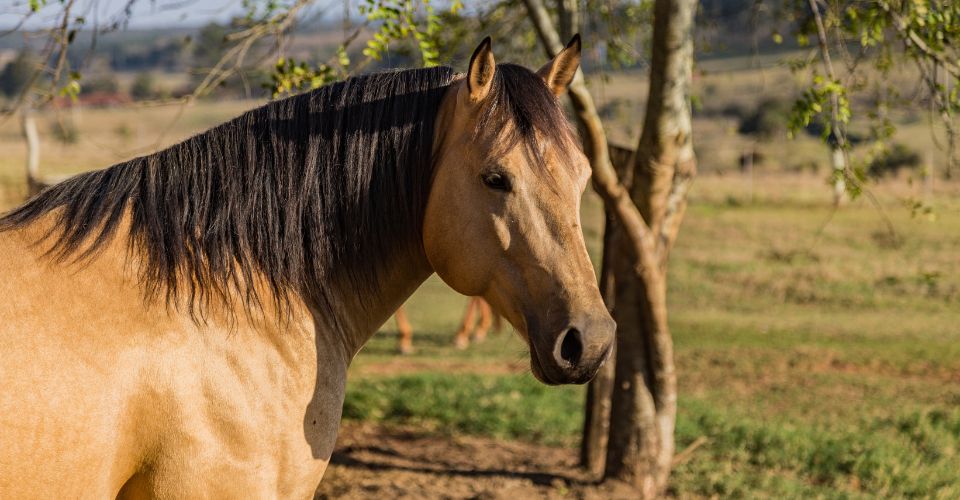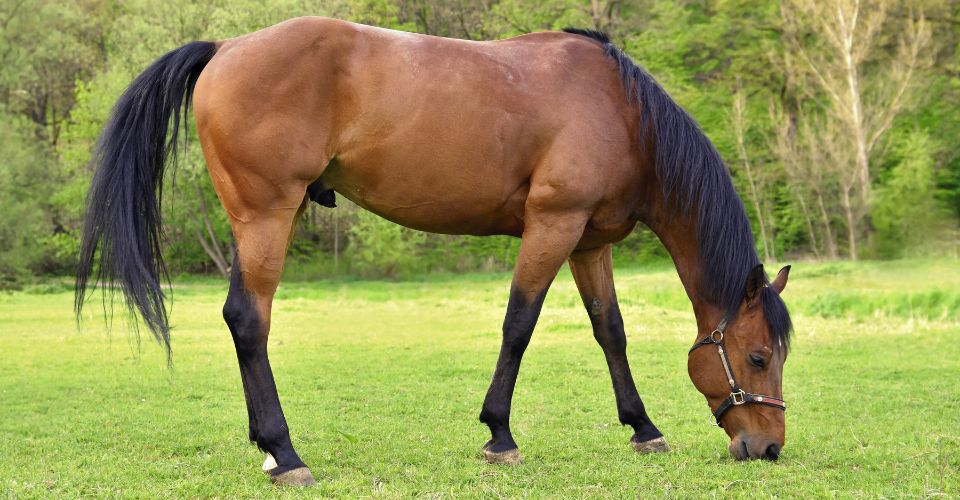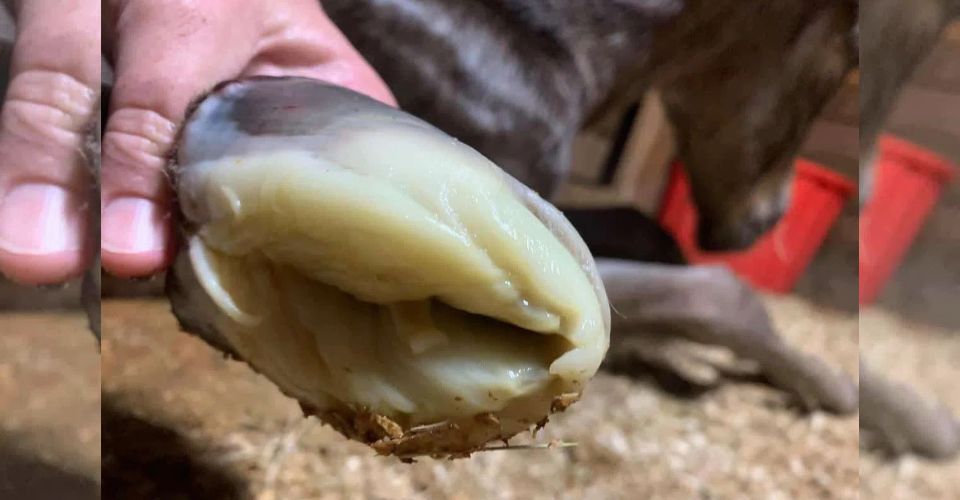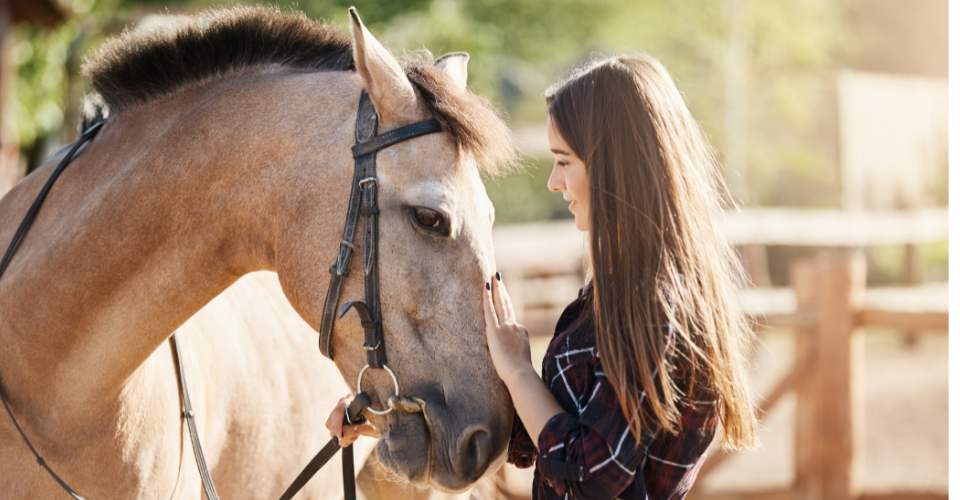A true definition of power and strength, horses are muscular and swift. In comparison to human beings, horses are much larger and heavy, and hence the potential of damage they can cause is far higher. With that said, one of their most prominent defense mechanisms is kicks – and their kicks can cause significant damage.
But does horse kick merely have a baleful influence, or is it actually life-threatening? In simple words, can a horse kick kill you? Why do horses kick in the first place? How to stay safe? We will find out. Let the answers kick in!
Horse Kicks Were Useful in the Past!
During earlier times, war horses were effectively trained to jump, kick, and attack the enemy on the battlefield. Similarly, in farming, well-trained ranch horses protected their owners from angry cattle by kicking at them.
Can a Horse Kick Kill You?
Yes, horse kick is powerful and can most certainly kill you, especially if it happens to catch you at critical areas such as the abdomen, chest, or head. Horses are might creatures and can easily kick with an impact of 1,200 psi, and some can even go up to the incredible force of 2,000 psi, which is harder than any well-trained boxer can punch. The hardest punch ever is rumored to be thrown by Mike Tyson of about 1,800 psi, 200 psi short of what a horse can easily throw.
Even if a kick does not kill you instantly, it might lead to other conditions like broken bones or internal bleeding that either cripple or scar you for life and often lead to a slow and painful death.
Did You Know?
Fractures in the extremities, spine, pelvis, head, and face are responsible for about 80% of the deaths caused by horse kicks, and the most common among those who die are sportspersons.
Why Do Horses Kick?
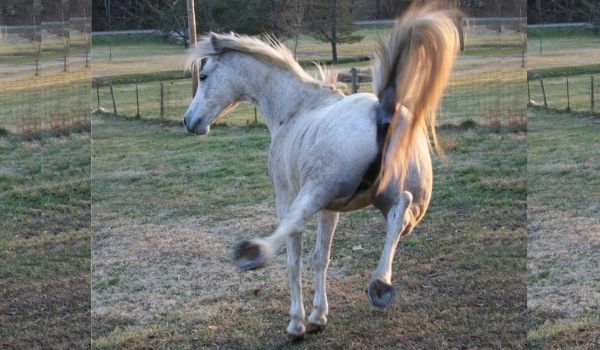
Horses are usually not aggressive around their owners, especially those who have a history of not showing aggression. Nonetheless, horses do not kick for no reason. There are always some reasons underlying horses kicking each other and horse kicking people. Below we have discussed some of the most common reasons why horses kick.
Dominance
Since horses are prey animals and live in herds, they have a hierarchy of status, also known as the pecking order. One of the ways to establish their dominance in their group is to kick other horses. Doing so, if a horse successfully intimidates others, it becomes a pack leader. Hence, a horse might kick the people around it in the same vein, trying to communicate that it is the boss.

To get rid of dominant behavior, horses need to understand the pecking order at the farm and learn that the farm owner, a human being, is the ultimate leader. To do so, horse owners must enforce their will, stand ground, and lead all the animals. However, note that teaching such a hierarchy demands time and skill.
Fear
Horses that have had any unpleasant experience usually respond with striking when they fear that it might occur again. For instance, a horse that had suffered pain due to stepping its hoof onto a nail in some specific terrain might kick when it suspects such reoccurrence.
Horses that develop fear need to be desensitized from the cause. However, like in the case of hierarchy training, this is also a demanding task.
Energy Blow Off
When horses are excited, they might lift their legs to blow off their energy, especially if they are young. Young stallions rearing up and throwing kicks with their front legs can be really life-threatening as there is a huge chance of such stallion kicks landing on the head of the person standing close by. Stallion kicks have the potential to crush the skull of the victim.
If your horse has a habit of rearing up, you should try to tame and relax it and maintain a safe distance. In the long run, try teaching it manners. Though it will take time, it will definitely reduce the risk of injuries.

Communication
Besides using their mouth and body language, horses also resort to kicking when trying to communicate – especially when within a herd. For instance, horses can end up kicking the objects or even a person around them when they are confined for a long time, thus trying to tell that it wants to go out. Similarly, a horse can also kick when it tries to pass a message that it is hungry. However, the owners must not rush to feed and stay safe until the kicking behavior has considerably lowered.
Blindspot
Horses have two blind spots – one at the front and the other behind. If a person approaches the latter one, she or he might risk getting kicked. Horses usually kick in this area to sense if someone has reached too close to them from behind. Therefore, precautionary measures need to be taken even while bathing your horse.
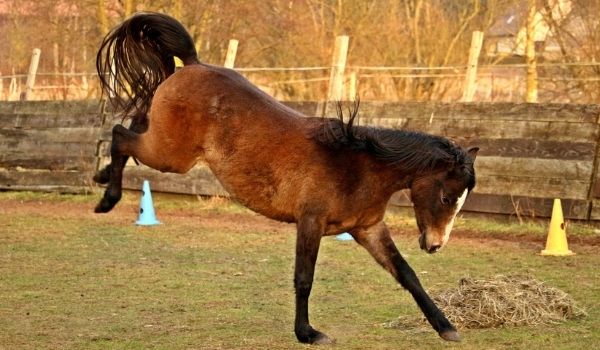
How to Tell if a Horse Is About to Kick?
Horses lash out without any provocation. However, there are a few signs indicating that a kick is imminent.
Typically, a chill and the happy horse has its ears straight and pointed in the upward direction. Conversely, when it pins its ears backward, it is a subtle sign of warning that it is angry and upset. Besides, they might also swing their tails repeatedly. If such a condition continues for some time, the horse will eventually prepare to kick by shifting its weight on one leg only, freeing the other to be used for attacking.
It is, hence, crucial to recognize these signs. To prevent your horse from kicking, divert its attention immediately and remove it from the situation or distance yourself. The horse will put its leg down and walk off.
How to Prevent a Horse From Kicking?
Imparting the training of good manners is the best way of preventing horses from kicking. Start with forming a close bond between you and your horse.
However, note that it is not possible to have a horse that does not kick at all. To prevent them from kicking too often, you can only tame them to a certain extent. Furthermore, if your horse is some kind of a chronic kicker, it is best suited to take the help of a professional.
Also, keep in mind that you must not resort to violence whenever your horse kicks. Any natural reaction such as slapping or kicking back neither helps nor has any positive effect.
How to Avoid Being Kicked by a Horse?
It is advisable to be cautious whenever you are around your horse, as kicking is a part of equine nature that cannot be gotten rid of completely. That being said, here are the ways to do so:
Walk Behind a Horse With Caution
First of all, walk beside and not behind. As the video below shows, most of those who received horse kicks were behind horses. But if there is a need to walk behind a horse, it is recommended to put your hand on its neck and run it all the way to the back slowly. This makes horses aware that you are near them and that you are going behind them, not a predator or anyone else.
Tip!
Be sure to stay close to your horse when you are behind it. Doing so will lessen the power of the kick if it kicks you.
Always Wear Helmet
Even when you are not riding your horse, try to always wear a helmet when you are near it. It will help lessen the impact and may prevent severe injuries. Aside from the hind legs, horses are also capable of hitting using their front legs.
Reports show that more than 60% of horse-related deaths are caused due to head injuries, and helmets reduce this risk by 70 to 80%.
Tuff Rider Helmet
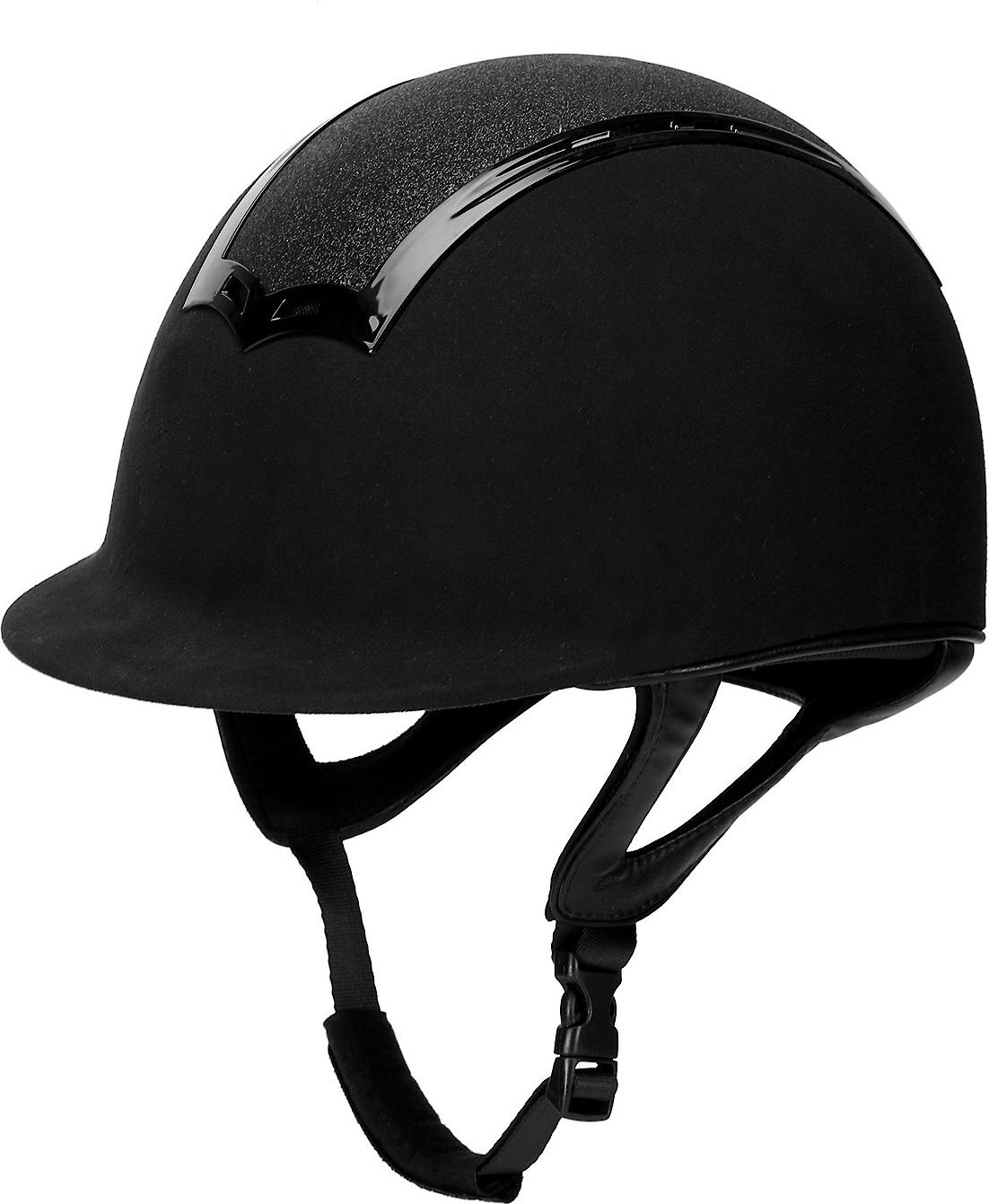
It is a certified protective gear for equestrians. It will save your skull from being crushed even if your horse throws a ferocious stallion kick with its front legs.
Never Be In an Enclosed Area With a Horse
As already discussed, horses might end up kicking around when they feel confined. Hence, it becomes a very bad idea to stay with a horse whenever it is enclosed in a small area, especially if you are behind it. Getting slammed against hard walls and floors, you can suffer severe injuries, potentially much greater than those inflicted upon you by getting kicked in an open area.
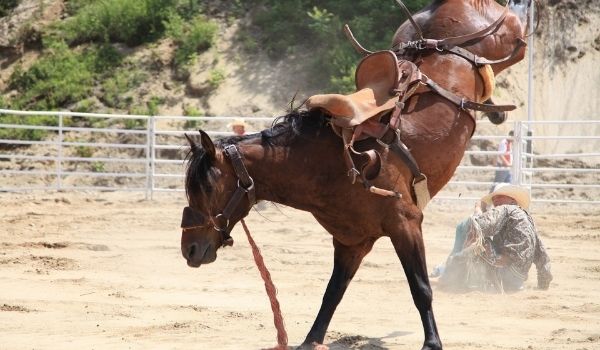
What to Do if a Horse Kicks You?
Despite all protective measures, you might still end up getting kicked by your horse. However, if that happens, you should remain calm and composed and get immediate medical attention with no delay at all.
Moreover, you should stay still as this will slow down the bleeding and may accelerate the stabilization of injuries. Even if there is no obvious bleeding, you should still go for medical assistance, especially if you have fainted and remained unconscious for some time.
Nevertheless, if the person kicked is not you, here are some first-aid techniques you can use to help them out:
- Before moving, make sure the person is stable and breathing regularly.
- Keep trying to stop bleeding until the ambulance arrives at the scene.
- Keep the limbs straight to keep further injuries at bay.
- Do not move the body parts where you suspect broken bones.
Final Verdict: Can a Horse Kick Kill You?
Horses are mighty creatures, and their kicks are powerful. With the incredible force of 1,200 to 2,000 psi, horse kicks can easily break bones or even kill people if they land in critical areas such as the head and chest.
The fatality of horse kicks should not dissuade you from enjoying the company of your horse to its full potential. Instead, it should prompt you to take the necessary precautions while riding your horse. Have a happy horse ride!

